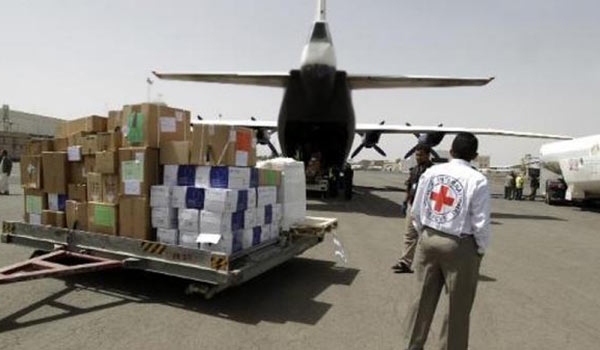
RNA - In the absence of the Saudi ambassador to Iran, the country’s chargé d'affaires was summoned to the foreign ministry after the Saudi warplanes prevented the cargo planes of the Iranian Red Crescent Society (IRCS), carrying pharmaceutical aids and also the wounded Yemenis who have been treated (in Iran), from entering Yemen's airspace despite obtaining the needed permissions from Saudi Arabia.
An Iranian foreign ministry diplomat said that the IRCS had obtained the needed permissions for Oman-Yemen flights and sent its airplanes carrying pharmaceutical aid and the treated wounded Yemenis to Yemen over the past two days, but unfortunately each time the Saudi warplanes approached the Iranian cargo plane and forced them to return.
Earlier today, the Saudi fighter jets intercepted the second Iranian airplane carrying humanitarian aid from entering Yemen's airspace.
An Iranian cargo plane carrying food stuff and medical equipment for the Yemeni people was shooed away from Yemen's airspace on Friday, the second such event in two days after Saudi fighter jets warned the first Iranian cargo plane that was bound for Sana'a airport to keep away from Yemen on Thursday.
This afternoon, Iranian Deputy Foreign Minister Hossein Amir Abdollahian in a telephone conversation with President of the International Committee of the Red Cross (ICRC) Peter Maurer blasted Saudi Arabia for blocking Iran's humanitarian aid to the Yemeni people.
"The Saudi warplanes have prevented the cargo planes of the Iranian Red Crescent Society (IRCS), carrying pharmaceutical aids and also the wounded Yemenis who have been treated (in Iran), from entering Yemen's airspace despite obtaining the needed permissions (from Saudi Arabia)," Amir Abdollahian said during the phone conversation.
The Iranian deputy foreign minister, meantime, called on ICRC president to take more serious measures to facilitate dispatch of medial and humanitarian aid to Yemen.
Amir Abdollahian also voiced Iran's readiness to treat more wounded Yemenis either in Iran or in Yemen.
On Wednesday, Amir Abdollahian stressed that sending medical aids and providing medical care for those injured in the Saudi-led strikes against Yemen set a priority for Tehran.
On Saturday the IRCS blasted Saudi Arabia for blocking Iran's humanitarian aid to Yemen.
"The IRCS humanitarian aid consignments are ready to be dispatched to Yemen, but unfortunately Saudi Arabia prevents their delivery to Yemen," Shahabeddin Mohammadi Araqi, IRCS deputy managing director for international and humanitarian affairs, announced.
Mohammadi Araqi described the Yemeni people's conditions as critical, and said, "We are in contact with Yemen's Red Crescent Society and Health Ministry and have included their needs in the new consignment."
He lamented that planes and ships are not allowed into Yemen's ports and airports, and said, "Unfortunately, the Saudi government has prevented the dispatch of aid to Yemen."
Iran has already sent five consignments of humanitarian aid to Yemen, including a total of 69 tons of relief, medical, treatment, and consumer items.
Earlier this month, Head of the Yemeni Red Crescent Society Mohammad Ahmad al-Kebab in a letter to his Iranian counterpart Seyed Amir Mohsen Ziayee thanked Iran for the recent humanitarian and medical aid cargoes sent to his country.
"I appreciate the unsparing help and relief operations as well as the humanitarian attempts of the Iran Red Crescent Society (IRCS)," al-Kebab said in his letter.
He expressed the hope that interactions and mutual cooperation between the two countries' Red Crescent societies would increase in future.
Aid agencies have warned of a rising humanitarian crisis including food shortages in Yemen as Saudi-led warplanes continue to hit the Arab country for a third week.
Humanitarian groups have struggled to bring aid into the country and said the situation in Aden was deteriorating rapidly.
"Shops are closed. We have a problem of food," said Marie-Elisabeth Ingres, the Yemen representative of Doctors without Borders (MSF), AFP reported on April 14.
Metaz al-Maisuri, an activist living in Aden, said basic services had stopped and there had been a "mass exodus" of civilians from the city.
"Schools, universities and all public and private facilities have been shut due" to the Saudi violence, he said.
"Residents' lives have become very difficult and complicated... They can no longer obtain the food they need," he said.
"We are unable to leave our houses to buy what we need because of the Saudi attacks," said Adwaa Mubarak, a 48-year-old woman in Aden.
"Our living conditions are bad. Bakeries are shut," she said.
Aid workers said Sana'a is also suffering, as airstrikes hit the capital and supplies dwindle.
"There is a food and water shortage. People are unable to move," said Marie Claire Feghali, the Red Cross spokeswoman in Yemen.
Iranian officials, on many occasions, have stressed that fueling sectarian disputes in the Muslim countries will only serve the interests of hegemonic powers and the Zionist regime of Israel, thereupon, Tehran has done its best to pave the ground for the peaceful settlement of disputes in the Middle-Eastern states, specially in Syria, Iraq and Yemen.
Iran has heightened efforts to broker talks among different Yemeni groups to establish peace in the country, and it sent a 4-step Yemen peace initiative to the UN chief last week.
On Tuesday, Riyadh declared that it stopped bombing Yemen, adding that the Saudi-led coalition operations are now entering a political phase, but the latest reports from different Yemeni cities said that the airstrikes are still underway.
Saudi Arabia has been striking Yemen for the last 30 days in a move to restore power to fugitive President Mansour Hadi, a close ally of Riyadh. The Saudi-led aggression has claimed the lives of around 2,900 Yemenis, including hundreds of women and children. The attacks have also left thousands of people injured.
Hadi stepped down in January and refused to reconsider the decision despite calls by Ansarullah revolutionaries of the Houthi movement.
Despite Riyadh's claims that it is bombing the positions of the Ansarullah fighters, Saudi warplanes are flattening residential areas and civilian infrastructures.
R111/108/C/